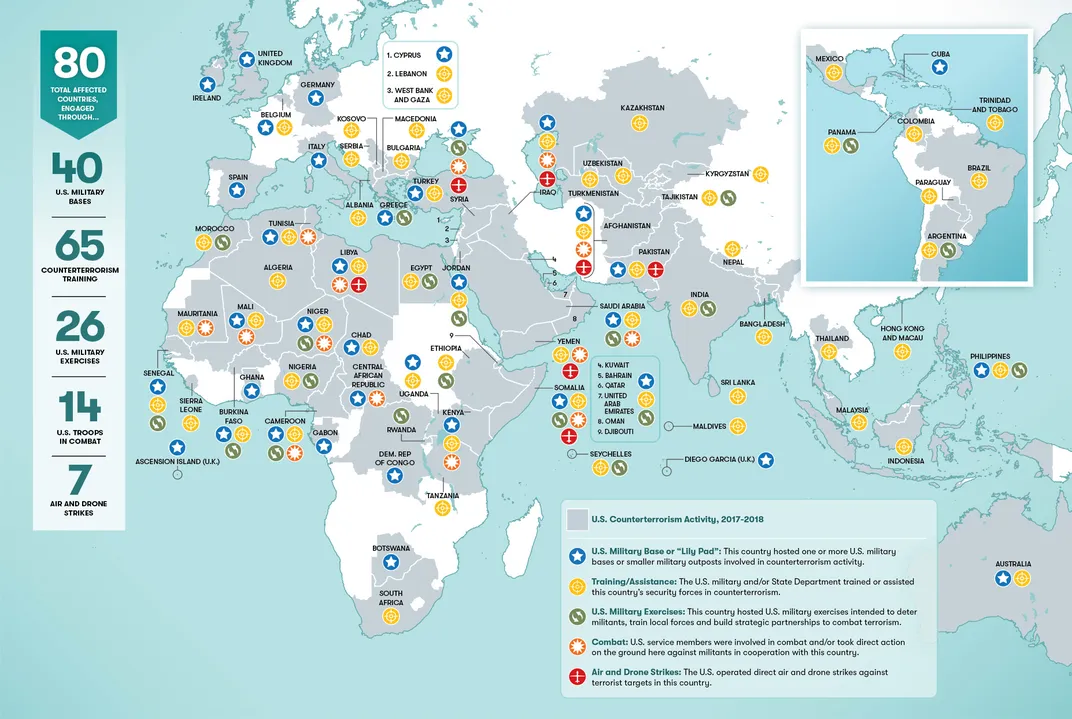This Map Shows Where in the World the U.S. Military Is Combatting Terrorism
The infographic reveals for the first time that the U.S. is now operating in 40 percent of the world’s nations

Less than a month after the September 11 terrorist attacks on the United States, U.S. troops—with support from British, Canadian, French, German and Australian forces—invaded Afghanistan to fight Al Qaeda and the Taliban. More than 17 years later, the Global War on Terrorism initiated by President George W. Bush is truly global, with Americans actively engaged in countering terrorism in 80 nations on six continents.
This map is the most comprehensive depiction in civilian circles of U.S. military and government antiterrorist actions overseas in the past two years. To develop it, my colleagues and I at Brown University’s Costs of War Project at the Watson Institute for International and Public Affairs, along with Smithsonian magazine, combed through U.S. and foreign government sources, published and unpublished reports, military websites and geographical databases; we contacted foreign embassies in the U.S. and the military’s United States Africa Command; and we conducted interviews with journalists, academics and others. We found that, contrary to what most Americans believe, the war on terror is not winding down—it has spread to more than 40 percent of the world’s countries. The war isn’t being waged by the military alone, which has spent $1.9 trillion fighting terrorism since 2001. The State Department has spent $127 billion in the last 17 years to train police, military and border patrol agents in many countries and to develop antiterrorism education programs, among other activities.
Because we have been conservative in our selections, U.S. efforts to combat terrorism abroad are likely more extensive than this map shows. Even so, the vast reach evident here may prompt Americans to ask whether the war on terror has met its goals, and whether they are worth the human and financial costs.
Research assistance by Rachel McMahon, Emily Rockwell, Dacus Thompson
**********
Sources: ABC News; AFRICOM; Al Jazeera; American Chamber of Commerce in Egypt; Arab News; Army Times; Asharq Al-Awsat; azcentral.com; BBC; The Bureau of Investigative Journalism; Caravanserai; Country Reports on Terrorism, U.S. Department of State (2017); CNN; The Daily Beast; Daily News Egypt; Defense News; The Diplomat; The Economic Times; ekathimerini.com; Emirates News 24/7; Eurasianet; globalresearch.ca; The Guardian; Gulf Times; Haaretz; The Jakarta Post; Marine Corps Times; Menastream; Military.com; Military Times; Adam Moore; The Nation; The National Herald: Greek News; The National Interest; Navaltoday.com; the New Republic; The New York Times; North Africa Post; NPR; Politico; RAND Corporation; Reuters; The Rwandan; The Star (Kenya); Stars and Stripes; Straits Times; Telesur; the Times of Israel; TomDispatch.com; Nick Turse; U.S. Army; U.S. Army Human Resources Command; U.S. Central Command; U.S. Department of Defense; U.S. Embassies of Various Countries; U.S. Naval Forces Europe-Africa /U.S. 6th Fleet; David Vine; The Wall Street Journal; war on the rocks; The Washington Post